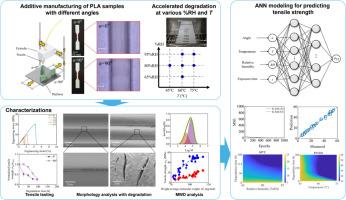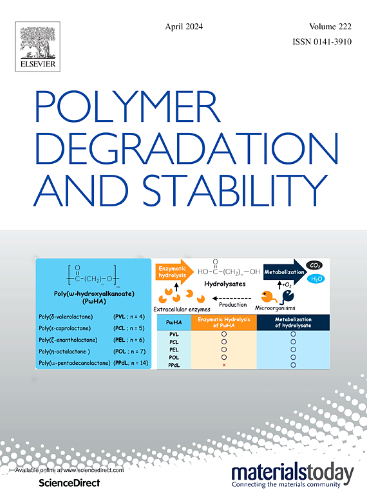温度和相对湿度对加成制造聚乳酸水解降解的影响:表征和人工神经网络建模
IF 6.3
2区 化学
Q1 POLYMER SCIENCE
引用次数: 0
摘要
了解三维打印聚合物材料在不同温度和湿度条件下的长期耐久性对于扩大其工业应用至关重要。因此,评估降解对拉伸强度等机械性能的影响至关重要。在本研究中,我们通过基于增材制造的三维打印技术制造了具有双重取向的试样,并将其置于各种温度和湿度条件下进行加速降解,以评估其在降解环境中的耐久性。在最恶劣的条件下,机械性能明显下降,分子量最大下降了 76.7%。我们对分子量分布的解卷积及其与机械性能的相关性进行了深入研究。我们得出了表示分子量分布解卷积得到的峰值与拉伸强度之间关系的方程式。此外,为了加快和简化拉伸强度评估,我们使用拉伸测试结果训练了一个人工神经网络(ANN)模型,以构建一个预测模型。人工神经网络将温度、湿度、印刷角度和时间作为输入数据,将拉伸强度作为输出数据。对该模型的验证表明,它能够准确预测不同温度和湿度条件下的拉伸强度。本文章由计算机程序翻译,如有差异,请以英文原文为准。

Effect of temperature and relative humidity on hydrolytic degradation of additively manufactured PLA: Characterization and artificial neural network modeling
Understanding the long-term durability of 3D-printed polymeric materials under varying temperature and humidity conditions is essential for expanding their industrial applications. Therefore, it is critical to assess the impact of degradation on mechanical properties such as tensile strength. In this study, we manufactured specimens with dual orientations by additive manufacturing-based 3D printing and subjected them to accelerated degradation under various temperature and humidity conditions to evaluate their durability in degradation environments. Mechanical properties significantly decreased under the most severe conditions, with a maximum reduction of 76.7 % observed in molecular weight. The deconvolution of the molecular weight distribution and its correlation with mechanical properties were thoroughly investigated. We derived an equation representing the relationship between the peaks obtained from deconvoluting the molecular weight distribution and the tensile strength. Furthermore, to expedite and simplify tensile strength assessment, we trained an artificial neural network (ANN) model using tensile test results to construct a predictive model. The ANN utilized temperature, humidity, printing angle, and time as input data, with tensile strength as the output. Validation of this model demonstrated the capability to predict tensile strength accurately under different temperature and humidity conditions.
求助全文
通过发布文献求助,成功后即可免费获取论文全文。
去求助
来源期刊

Polymer Degradation and Stability
化学-高分子科学
CiteScore
10.10
自引率
10.20%
发文量
325
审稿时长
23 days
期刊介绍:
Polymer Degradation and Stability deals with the degradation reactions and their control which are a major preoccupation of practitioners of the many and diverse aspects of modern polymer technology.
Deteriorative reactions occur during processing, when polymers are subjected to heat, oxygen and mechanical stress, and during the useful life of the materials when oxygen and sunlight are the most important degradative agencies. In more specialised applications, degradation may be induced by high energy radiation, ozone, atmospheric pollutants, mechanical stress, biological action, hydrolysis and many other influences. The mechanisms of these reactions and stabilisation processes must be understood if the technology and application of polymers are to continue to advance. The reporting of investigations of this kind is therefore a major function of this journal.
However there are also new developments in polymer technology in which degradation processes find positive applications. For example, photodegradable plastics are now available, the recycling of polymeric products will become increasingly important, degradation and combustion studies are involved in the definition of the fire hazards which are associated with polymeric materials and the microelectronics industry is vitally dependent upon polymer degradation in the manufacture of its circuitry. Polymer properties may also be improved by processes like curing and grafting, the chemistry of which can be closely related to that which causes physical deterioration in other circumstances.
 求助内容:
求助内容: 应助结果提醒方式:
应助结果提醒方式:


